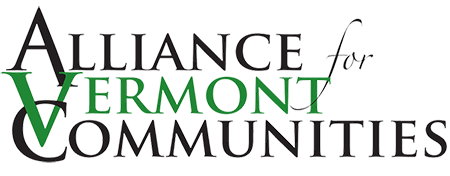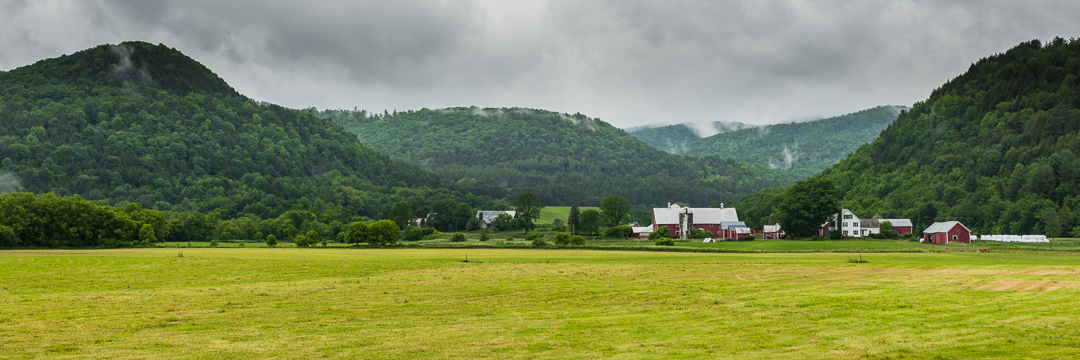Won’t Act 250 prevent the NewVistas Project from happening?
Not necessarily. Act 250 is a set of provisions that ensures that any development is conducted within the confines of the regional and local town plans. Therefore, it is critical to revisit our local and regional town plans to make sure they are strong enough to protect the farms and forestlands of our rural areas, while still allowing limited development. These goals are consistent with Vermont’s goal “to plan development so as to maintain the historic settlement pattern of compact villages and urban centers separated by rural countryside” (Smart Growth Vermont Principles). Each town must create their strategic vision for the future of their community and strengthen their town plans to ensure that Act 250 could standup to a development of this nature.
David Hall is intent on not letting Act 250 stand in his way. In fact, when asked whether he would lobby VT legislators to change Act 250 to allow his project to succeed, Mr. Hall answered:
Lobby is a funny word. I am not going to hire a bunch of lobbyists. You figure out what the best laws are, and then you work with the legislators and the people to try to get those changes made. And that will definitely happen over time. But like I say, from my point of view right now, Act 250 enables me, it’s not going to stop me. It actually is the thing that enables this possibility.
– David Hall at the Tunbridge Forum with TRORC (Daily UV, April 2, 2016)
Currently, there are no limits to how much land a property owner can purchase. If he owns enough land, Mr. Hall may have the political clout to change regional and town plans to enable his development. In Provo, UT where he is attempting to develop another NewVistas community, he has repeatedly violated city codes and ordinances, which indicates that he does not have a high regard for local laws and requirements.
NewVistas is unlikely to happen and any potential development is so distant in the future. Why put time, energy, and money into fighting it now?
The impact of NewVistas is already having an adverse effect on our communities.
Since October 2015, the NewVistas Foundation has purchased over 1,500 acres in the Towns of Royalton, Tunbridge, Strafford, and Sharon and has threatened to purchase a total of 5,000 acres. Mr. Hall claims his development plans are in the distant future but he continues to buy land quickly. This land grab is frightening away potential home-buyers in our communities and disrupting the lives and plans of long-time residents. His land purchases have created a false real estate market with little competition since the presence of NewVistas is scaring away potential buyers. This will ultimately stand in the way of diversifying and sustainably growing our communities.
If Vermont’s rural character, farms and forests, and heritage are to be protected in a lasting way, then land conservation and resource protection measures TODAY are essential. That is why our campaign put great weight on positive measures to sustain the cultural heritage and natural values of the affected region.
I am in favor of sustainable development of our Vermont communities. Isn’t NewVistas a type of sustainable development? Why should I oppose this sustainable solution?
Mr. Hall and the NewVistas Foundation claim that the plan is sustainable in design, and it contains language that suggests that it is sustainable; however, this is an example of “greenwashing”, or falsely claiming to be green in order to sell the idea. It includes elements that are considered unsustainable, such as the use of natural gas for power generation, which we know is nearly impossible in Vermont. Furthermore, deforestation and excavation on a massive scale would be required to develop the underground podways that connect buildings throughout each community and between multiple NewVistas communities. Mr. Hall has already begun to clear-cut some of his properties in the four Towns.
Another example of how the NewVistas model goes against sustainable living in Vermont is using mechanized animal farming, which restricts the movement and size of the space required for the animals. Livestock will exist outside of the “town” area of a NewVistas development, along side “drilling sites” where they will extract natural resources (Bloomberg article).
Yet another example of the unsustainable nature of the NewVistas model is the estimated water consumption per person. NewVistas proposes 258 gallons per person, but the current average water consumption per capita in Vermont is just 75 gallons (2010 Estimated Water Withdrawals and Return Flows in Vermont in 2005 and 2020 U.S. Geological Survey).
Given the massive scale of the project, Vermonters can expect other negative impacts, such as increased light and noise pollution, water table issues, and increasing the susceptibility of our remaining forests to blight and eco-diversity loss.
Vermont is already ahead of Hall’s vision for renewable energy, as Green Mountain Power and other local utilities have made extensive efforts towards the development of solar and wind alternatives that are fossil-fuel free. Partnerships exist with the Tesla Corporation to install batteries in every home to capture excess power off the grid and provide power even when the grid is not available. These renewable energy initiatives should continue to be the focus of Vermont as they are designed specifically for the needs and capabilities of our State, and they already exceed the energy goals of NewVistas.
Won’t NewVistas create jobs and help our local economies?
NewVistas is designed be a self-contained community available only to its participants; therefore, it will not create jobs for those who choose to live outside of the NewVistas community. It will not have a direct economic benefit to our local towns. In fact, it is more likely to be an economic drain because of the negative impacts a megalopolis like this would have on local food production, outdoor recreation, tourism, and other economic drivers of our region.
How will NewVistas impact local schools?
NewVistas will impact our local schools in two ways:
1) Local school enrollment will continue to decline if a decrease in new home buyers continues to decline due to the massive land acquisitions by NewVistas
2) The NewVistas model outlines that it will not participate in the local school district, but will create its own private school district
This creates a situation where the younger generation of Vermonters is incentivized to move elsewhere to enroll their children in more lively and diverse school districts.
How will NewVistas impact our emergency services?
We are unsure at this time how NewVistas will impact our emergency services. The impact may also change over time during various stages of the development and if/when NewVistas decides to provide their own services for their community. Currently, our volunteer ambulance and fire services and also state level services (police) would be inadequate to safely respond to an increase in population of 20,000 or more.
How will NewVistas impact our local governance?
The NewVistas community will be organized and operated using a top-down, corporate structure that would be inconsistent with, and ultimately destroy, the grassroots democracy, town meeting style of government of which we Vermonters are so proud.
NewVistas has purchased land all around my property. How will this affect my property value?
The NewVistas land acquisitions have created a false real estate market in our area. They have used high-pressure sales tactics and repeated inquiries to landowners, often posing a 24-hour limited offer to pressure landowners into selling. NewVistas is also not paying a premium for these properties, but is buying at or even below market value in some cases. Coupled with the false real estate market, NewVistas has managed to depress the area in a way that there is no new growth, both in younger and older generations. There is anecdotal evidence that due to this, people are choosing not to move to this area. This also means that any property in which Mr. Hall is not interested likely will not be sold.
Tell me more about the corporate nature of NewVistas.
The entire NewVistas development will be run and maintained by a single corporation called the NewVistas Trust. Every resident of NewVistas will be required to hand over all of his/her assets and are required to be an employee of NewVistas. Residents will be allowed to start a “Vistabiz” providing products or services within NewVistas, and these businesses will be ultimately owned by the holding company. Any profits will be returned to the NewVistas Trust and invested back into the NewVistas community. This creates what they call an “econosystem”, or a micro-economy exclusive to NewVistas. The tax implications of this structure is not yet clear, however since the NewVistas Trust will not be located only in Vermont, it is likely that taxes will be paid outside the State of Vermont.
How can I get involved?
- Write letters to the editor
- Write letters to your legislators to express your concerns
- Help strengthen town and regional plans to protect our communities with Act 250
- Volunteer with AVC
- Support AVC with a tax-deductible donation
- Consider investing in property in Royalton, Tunbridge, Sharon or Strafford
- Consider putting your land into conservation
- Connect with us:
Facebook: “Alliance for Vermont Communities” and “Stop The NewVistas Project”
Instagram: @alliancevermont
Email: info@alliancevermont.org

